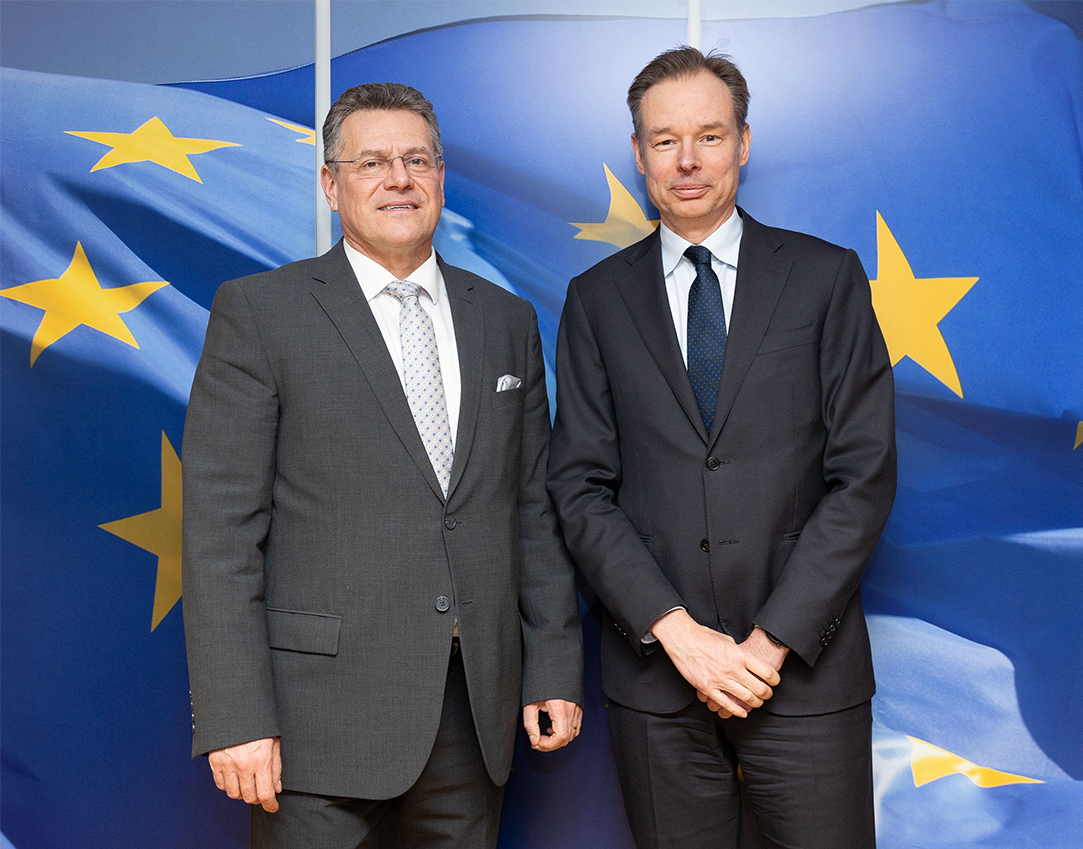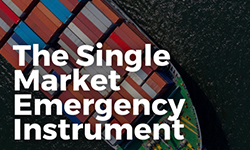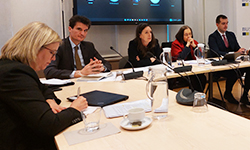BusinessEurope Headlines No. 2023-08
How to keep Europe a good place to invest: discussion with Vice-President Šefčovič

“High energy costs and a heavy regulatory burden are two structural issues that weigh heavily on the competitiveness of the European industry. It is positive that the European Commission increasingly recognises that successful companies are fundamental for a strong and competitive Europe. More work needs to be done to keep Europe a good place to invest and do business”, said BusinessEurope President Frederik Persson when meeting European Commission Vice-President Maroš Šefčovič on 8 March. Besides the investment climate in the EU, the exchange of views between BusinessEurope and the Commissioner also focused on the EU’s relations with Switzerland and the UK. Markus J. Beyrer, our Director General, added that stable trade relations with our most important partners are also key for our competitiveness. Therefore, European business welcomes the announcement of an EU-UK deal on Northern Ireland. “It promises to end a long-standing row about the post-Brexit trading arrangements in the region and help prepare the ground for closer EU-UK cooperation on issues vital for companies on both sides of the channel”, he pointed out.
Photo © European Union, 2023
Contact: Benedikt Wiedenhofer
Our comment
Future-proofing the EU electricity market rules
By Agata Zalewska, Adviser for energy policy

European businesses and households are living through the most serious energy crisis of the past decades. Energy prices in Europe are still 7 times higher than in the USA and 3 times higher than in China, which has a dramatic impact on the already decreasing competitiveness of European companies.
At the same time, Europe has a clear direction of travel stemming from its ambitious decarbonisation agenda. Our more and more decarbonised economy will be based on an increasing use of electricity, which will need massive investments in power generation in the next decades.
There is therefore a need to consider which design of the electricity market best serves the two crucial objectives: providing solutions to the ongoing energy crisis, and at the same time preparing the market rules for increasing electrification.
The European Commission is planning to publish a legislative proposal for reforming the European electricity market on 16 March. It is essential that five key principles are at the core of the market reform:
Strengthening security of supply
The current energy crisis has brought to the core the often overlooked security of supply. While we should continue to rely primarily on a market-based approach, there is a need to consider whether the current “energy only” market is able to simulate the investments necessary to reach ambitious climate targets. This is why different kinds of technology-neutral capacity mechanisms could be considered to ensure adequate investments in back-up power.
Completing market integration through cross-border trade
In general, and especially in a situation of potential supply blackouts, restricting or distorting cross-border energy trade should be avoided. Not only does cross-border trade provide monetary benefit, but it is also essential in securing supply. Further integration of European electricity and gas markets is key.
Limiting the impact of high gas prices on electricity prices for consumers
Offering more hedging opportunities for consumers through long-term contracting, including through Power Purchase Agreements (PPAs) or Contracts for Difference (CfDs), will help to reduce the influence of gas price swings on consumer prices. The use of such long-term contracts should be considered first before assessing whether changes to the pricing mechanism would be necessary.
Incentivising investments in flexible sources
Integration of more and more intermittent renewable requires the growing use of dedicated storage, supply- and demand-side flexibility technologies and approaches, which could be supported by appropriate market incentives. For instance, procuring demand-side resources by national system operators could be more flexible to allow more sectors to contribute. At the same time, the overall aim should be to ensure a stable energy market and a reliable energy supply, without over-dependency on user flexibility.
Empowering consumers
Meeting the decarbonisation targets will require an increased role of prosumers, including industrial prosumers, which needs to go hand in hand with adequate infrastructure and market-based solutions. To strengthen the role of the industrial prosumer, participation in the renewable energy communities should be extended to companies belonging to the same industrial cluster or value chain. At the same time, it is crucial for consumers to be able to access a wide range of supply offers in order to allow them to manage their exposure to price volatility, depending on their willingness to hedge.
![]() Contact: Agata Zalewska
Contact: Agata Zalewska
Exchange on the Green Deal Industrial Plan with Commissioner Breton
 BusinessEurope participated in a discussion on the Green Deal Industrial Plan with European Commissioner for the Internal Market Thierry Breton during a meeting of the Commission expert group "Industrial Forum" on 7 March. “Nowadays, European companies are facing specific challenges resulting from high energy prices, regulatory costs as well as lengthy permitting procedures in Europe. And on top of these “push” factors that risk diverting investments away from Europe, there is now the “pull” factor represented by the U.S. Inflation Reduction Act (IRA)”, our representative Kari Hietanen highlighted. We acknowledge positively the attention on the urgency to address Europe’s competitiveness challenges, and the Green Deal Industrial plan is a step in the right direction. At the same time, the net-zero transformation is an endeavour for the whole European industry. All sectors need to be part of the transformation if Europe is to achieve its goal of climate neutrality. Hietanen concluded that while we see debates on energy prices, speeding up permits, public financing and state aid rules, we still miss a real acknowledgement of the need to ease the overall regulatory burden and cumulation of legislations in Europe. “What we need is therefore a true debate and concrete actions to lower the regulatory burden for European companies”, he said.
BusinessEurope participated in a discussion on the Green Deal Industrial Plan with European Commissioner for the Internal Market Thierry Breton during a meeting of the Commission expert group "Industrial Forum" on 7 March. “Nowadays, European companies are facing specific challenges resulting from high energy prices, regulatory costs as well as lengthy permitting procedures in Europe. And on top of these “push” factors that risk diverting investments away from Europe, there is now the “pull” factor represented by the U.S. Inflation Reduction Act (IRA)”, our representative Kari Hietanen highlighted. We acknowledge positively the attention on the urgency to address Europe’s competitiveness challenges, and the Green Deal Industrial plan is a step in the right direction. At the same time, the net-zero transformation is an endeavour for the whole European industry. All sectors need to be part of the transformation if Europe is to achieve its goal of climate neutrality. Hietanen concluded that while we see debates on energy prices, speeding up permits, public financing and state aid rules, we still miss a real acknowledgement of the need to ease the overall regulatory burden and cumulation of legislations in Europe. “What we need is therefore a true debate and concrete actions to lower the regulatory burden for European companies”, he said.
Contact: Daniele Olivieri
Preparing for the 60th anniversary of EU-South Korea diplomatic relations
 The impact of EU regulations like the Carbon Border Adjustment Mechanism (CBAM) and the ramifications of the U.S. Inflation Reduction Act were some of the topics discussed between Luisa Santos, Deputy Director General of BusinessEurope, and Jeong Marn-ki, Vice-Chairman of the Korea International Trade Association (KITA), on the occasion of his visit to Brussels on 2 March. This year, the EU and South Korea will celebrate the 60th anniversary of their diplomatic relations. The bilateral free-trade agreement applied since 2011 was both the EU's first trade deal with an Asian country and the first to include a chapter on trade and sustainable development.
The impact of EU regulations like the Carbon Border Adjustment Mechanism (CBAM) and the ramifications of the U.S. Inflation Reduction Act were some of the topics discussed between Luisa Santos, Deputy Director General of BusinessEurope, and Jeong Marn-ki, Vice-Chairman of the Korea International Trade Association (KITA), on the occasion of his visit to Brussels on 2 March. This year, the EU and South Korea will celebrate the 60th anniversary of their diplomatic relations. The bilateral free-trade agreement applied since 2011 was both the EU's first trade deal with an Asian country and the first to include a chapter on trade and sustainable development.
Contact: Eleonora Catella
Enhancing the potential of digitalisation is key to foster employee mobility
 Employers see great potential in the role of digitalisation when it comes to facilitating mobility, including through more simplified approaches to social security coordination. Fostering mobility, as well as preserving it during times of crisis is essential. The proposed Single Market Emergency Instrument should ensure a targeted, effective and enforceable legal framework that protects the freedoms of the Single Market in any emergency situation, controls national and European anti-crisis measures to meet the basic principles of necessity, proportionality and non-discrimination, and ensures real-time administrative cooperation and access to information for businesses and citizens. These were among the key messages conveyed by Maxime Cerutti, BusinessEurope Director of Social Affairs, at a hearing organised by the European People’s Party group in the European Parliament on 8 March. In parallel, it remains important to find a solution to the ongoing trilogue negotiations over the revision of Regulation 883/04 on social security coordination. This includes an exemption from prior notification for business trips and other activities.
Employers see great potential in the role of digitalisation when it comes to facilitating mobility, including through more simplified approaches to social security coordination. Fostering mobility, as well as preserving it during times of crisis is essential. The proposed Single Market Emergency Instrument should ensure a targeted, effective and enforceable legal framework that protects the freedoms of the Single Market in any emergency situation, controls national and European anti-crisis measures to meet the basic principles of necessity, proportionality and non-discrimination, and ensures real-time administrative cooperation and access to information for businesses and citizens. These were among the key messages conveyed by Maxime Cerutti, BusinessEurope Director of Social Affairs, at a hearing organised by the European People’s Party group in the European Parliament on 8 March. In parallel, it remains important to find a solution to the ongoing trilogue negotiations over the revision of Regulation 883/04 on social security coordination. This includes an exemption from prior notification for business trips and other activities.
Contact: Maxime Cerutti
Supporting European companies to manage human rights risks in supply chains
 We support the European External Action Service (EEAS) in doing more to help European companies manage human rights risks in supply chains. The EEAS has a key role to provide companies with the necessary information, advice and legal certainty as regards to the situation in third countries where human rights violations exist or are a risk factor. This is key to support companies' decisions in terms of presence, investment and business relations in those countries. The EEAS should scale up its activities to mobilise EU delegations in the relevant third countries, in coordination with Member States' diplomatic services and in close cooperation with relevant services in the European Commission, so that EU companies know in practice how to proceed when considering their business operations in third countries where human rights risks are an issue. These were the key messages provided by BusinessEurope to the EEAS at a meeting on business and human rights held on 1 March. The meeting included two panels with speakers from the EEAS, the International Organisation of Employers (IOE), and some national member federations of BusinessEurope. A number of companies – Randstad, Michelin, Mercedes-Benz, H&M, and Walmart – also presented their experience, practices and needs for assessing and mitigating human rights risks in view of the concrete situations and challenges they face in practice when doing business around the world.
We support the European External Action Service (EEAS) in doing more to help European companies manage human rights risks in supply chains. The EEAS has a key role to provide companies with the necessary information, advice and legal certainty as regards to the situation in third countries where human rights violations exist or are a risk factor. This is key to support companies' decisions in terms of presence, investment and business relations in those countries. The EEAS should scale up its activities to mobilise EU delegations in the relevant third countries, in coordination with Member States' diplomatic services and in close cooperation with relevant services in the European Commission, so that EU companies know in practice how to proceed when considering their business operations in third countries where human rights risks are an issue. These were the key messages provided by BusinessEurope to the EEAS at a meeting on business and human rights held on 1 March. The meeting included two panels with speakers from the EEAS, the International Organisation of Employers (IOE), and some national member federations of BusinessEurope. A number of companies – Randstad, Michelin, Mercedes-Benz, H&M, and Walmart – also presented their experience, practices and needs for assessing and mitigating human rights risks in view of the concrete situations and challenges they face in practice when doing business around the world.
Contact: Stefan Enica
Business calls for manageable foreign subsidies instrument
 BusinessEurope has always been highly supportive of the underlying foreign subsidies regulation (FSR), and we believe that it has great potential to level the playing field in the EU Single Market. Yet, we have always pointed out that, while the instrument needs to be effective, the administrative burden it creates for companies and public administrations needs to be kept as low as possible. In our contribution to the EU online public consultation on the implementing regulation setting the procedural details of the foreign subsidies instrument, submitted on 6 March, we point out that the draft implementing regulation does not meet this requirement as it does not sufficiently specify the scope of the concept of “foreign financial contributions”. In its current form, it would thus impose excessive reporting requirements on companies and overwhelm the European Commission with irrelevant information. To avoid this outcome, the implementing regulation needs to exclude less relevant types of foreign financial contributions from reporting obligations, or at the very least be accompanied by waivers that do so. This is particularly important at a time when high energy costs already put European companies at a competitive disadvantage internationally and jeopardise the attractiveness of the EU as an investment destination.
BusinessEurope has always been highly supportive of the underlying foreign subsidies regulation (FSR), and we believe that it has great potential to level the playing field in the EU Single Market. Yet, we have always pointed out that, while the instrument needs to be effective, the administrative burden it creates for companies and public administrations needs to be kept as low as possible. In our contribution to the EU online public consultation on the implementing regulation setting the procedural details of the foreign subsidies instrument, submitted on 6 March, we point out that the draft implementing regulation does not meet this requirement as it does not sufficiently specify the scope of the concept of “foreign financial contributions”. In its current form, it would thus impose excessive reporting requirements on companies and overwhelm the European Commission with irrelevant information. To avoid this outcome, the implementing regulation needs to exclude less relevant types of foreign financial contributions from reporting obligations, or at the very least be accompanied by waivers that do so. This is particularly important at a time when high energy costs already put European companies at a competitive disadvantage internationally and jeopardise the attractiveness of the EU as an investment destination.
![]() Contact: Benedikt Wiedenhofer
Contact: Benedikt Wiedenhofer
Horizon Europe: more industry participation to maximise the impact
 “In a world of rapid technological development and increased global competition, the EU needs to continuously step up its efforts to create an attractive and competitive market for research, development and innovation (RD&I). The Horizon Europe programme plays a central role in leveraging investments, boosting innovation and funding excellent research. However, more ambitious industry participation is required to maximise impact and valorisation rates”, states BusinessEurope in its response to the public consultation on the Horizon Europe programme mid-term review. Technology and innovation developed with and from industry plays a vital role for a competitive European economy. A larger share of the Horizon Europe budget should thus be allocated to tackle global challenges, enable collaborative RD&I and bring key technologies to industrial maturity. BusinessEurope has identified nine priority areas for action.
“In a world of rapid technological development and increased global competition, the EU needs to continuously step up its efforts to create an attractive and competitive market for research, development and innovation (RD&I). The Horizon Europe programme plays a central role in leveraging investments, boosting innovation and funding excellent research. However, more ambitious industry participation is required to maximise impact and valorisation rates”, states BusinessEurope in its response to the public consultation on the Horizon Europe programme mid-term review. Technology and innovation developed with and from industry plays a vital role for a competitive European economy. A larger share of the Horizon Europe budget should thus be allocated to tackle global challenges, enable collaborative RD&I and bring key technologies to industrial maturity. BusinessEurope has identified nine priority areas for action.
![]() Contact: Emelie Månsson
Contact: Emelie Månsson
Calendar 
- 23-24 March: ERA Annual Conference on European Labour Law 2023
- 18 April: VAT in the digital age: digital / real-time reporting - Implications for businesses and compliance processes
- 6 June: Reuters Event: Responsible Business Europe 2023
- 14-15 June: International IP Enforcement Summit
- 19-20 June: TDI23 – Day of Industry
Not yet a subscriber? Register here.
Reminder: please have a look at our privacy policy